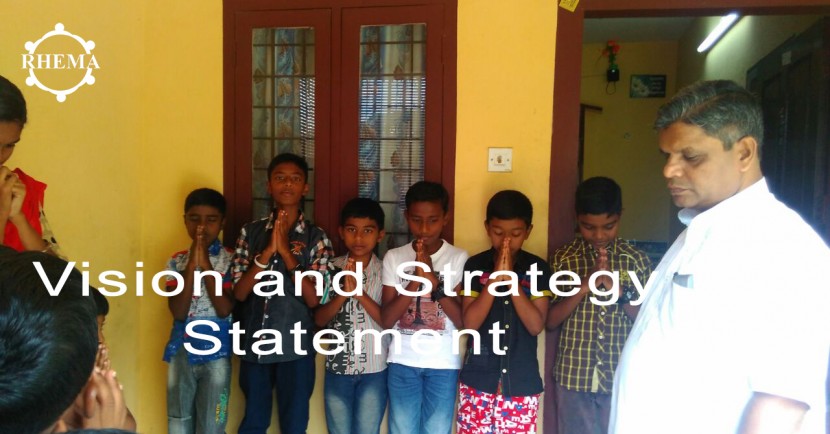R.H.E.M.A. INSTITUTE
Mission Statement Guiding Principles Vision Strategy
Romans 1:1 II Timothy 2:2 Matthew 28:19-20 Philippians 4:14-19
Dr. Ron Herrod
In Romans 1:1, Paul speaks of being called. My call to preach came to me as a teenager in 1958. There has never been any doubt in my heart about that call. In 1995 God’s call to begin this ministry was just as clear. So we left a very secure and well paid position and launched out by faith. The Greek word rhema means “a word from God.” (Ephesians 6:17) God gave us a clear word to begin this ministry of evangelism and missions. The RHEMA Institute was a clear vision for us to do the task God has given us.
The history of Christian missions can be written in 3 chapters . . .(1.) the Book of Acts, (2) the modern missions movement begun by men like William Carey, and (3) now the training of national pastors, church planters, evangelists and other Christian leaders.
The need worldwide is beyond comprehension. The world population is now closing in on 7.5 billion souls. It is estimated that only about 2 billion could be considered “Christian” if you include Roman Catholics and nominal Christians. That would leave more than 5 billion who are lost. If they formed a single line within arm’s length of one another, they would circle the globe 50 times.
Currently there are more than 11,000 people groups on planet earth. Of these more than 6000 are unreached and more than 3000 are unengaged. Is there any hope for these multitudes who live in darkness?
Consider several words that present the guiding principles that form the strategy and vision for this ministry.
- SENT – Matthew 28:19-20; Acts 1:8; John 20:21
Every child of God has been sent to be a part of reaching a lost world. The question is are we living our lives with a duty mentality or with a mandate? If your house is burning down, you are not concerned with polishing your fingernails or rearranging the pictures. You have an urgency.
Our world today is on fire with war, disease, starvation, ignorance, immorality, natural disasters, addictions, and many other issues afflicting all humanity. If ever there was a time when Christians should have a sense of urgency, it is now. How many cities, towns, and villages throughout the world are waiting for someone to come and share the Good News? How ludicrous is it that 6% of the world’s population in the U.S. receive 90% of the Christian message and teaching. What a privilege is ours to be able to share the Christian Gospel with people who have never heard? WE have a divine mandate. Our challenge is to evaluate everything in our lives – hobbies, jobs, activities, spending, lifestyle; as it relates to Christian missions.
We do not have an option of reaching out to those in our home country or those in other places. We must reach out to both in an effective manner. The Great Commission is not a cafeteria line. We must do both. Everything indicates that the coming of our Lord for His Church is very near. So we need to have our eye on the sky and our hand on the plow. We are sent.
- STRATEGY – II Timothy 2:2
A mandate must always find a method. The why determines the how. For many years, my ministry was primarily evangelistic with even large crusades with hundreds coming to Christ.
The Holy Spirit made it clear to me and to our board and associates that the key to reaching an entire world for Christ was an army of trained spiritual leaders, faithful men who will do the work of the Kingdom of God without begging, pushing, cajoling, or shaming from me or anyone else. Multiplication is through discipleship, a strategy based on II Timothy 2:2.
We provide 9-10 weeks of training to men in developing countries. These are primarily men who have no other way to receive training. We seek to provide support for one year to our graduates who will plant a church where no church currently exists. We do not build church buildings except in rare situations. We expect established local churches to assist with the planting of new churches and become a catalyst for accountability and support.
We use solid, Biblical material as curriculum for our students. Our students are taught, Biblical Methods, Old Testament, New Testament, Doctrine, Homiletics, Pastoral Ministries, Evangelism and Missions, Church Planting, Marriage and Family, Leadership and other subjects as needed. We send the best teachers available to instruct, disciple and mentor our students. WE expect our graduates to reproduce themselves in others according to the plan set forth in II Timothy 2:2. Our graduates receive a diploma from RHEMA and a certificate of pastoral ministries from William Carey University.
Oswald Smith said, “God’s method is a man.” If we can transfer our spiritual DNA into this man, he will help us change the world. WE partner with many but it is our “sons” that are themost effective. It nevere ceases to amaze me how many of our graduates call me “dad.” I am a spiritual father ot many of them and now a spiritual grandfather to many.
It is important to have “sons” in the ministry. A son has his father’s DNA, is a servant, is loyal, and a follower. The “father” sees his son as an asset, cares for him, is proud of him, allows for mistakes and is committed to his success. Let’s fill the earth with Timothys who carry our DNA.
- SUPPORT AND SACRIFICE II Corinthians 8:3
Vision is the root word for provision. There must be a method and strategy that works to reach the lost of the world and train effective leaders. But there must also be the support which often requires the sacrifice of God’s people who have been blessed with t he ability tosupport those who go. That means MONEY but money is noit the answer if it is not going to strategy that works.
Over many years I have been the sad witness to many projects, programs, land campaigns that have wasted the money of God’s people. It is high time for our missions ministries to be effective, ethical and efficient. WE need to get real missions on the platforms of our churches. We must develop a mentality that missions is not a program of the church, it is THE work of the church.
There are three essential components –
Simplicity – Training and supporting national indigenous church planters and pastors is not a complex method; it is a simple, proven Biblical method of reaching a lost world.
Sincerity – Words like integrity, honesty, frugality, wisdom, unselfishness, trust and faithfulness are part of a missions strategy that works. It is then worthy of your investment.
Sacrifice – I feel ashamed when I read II Corinthians 11:23-27 or when I visit among our graduates and church planters in places like India and Nepal. Just compare the interest we pay on church debt or the cost of our steeples with what it cost to train church leaders and support them to plant churches. Steeple, or people?
Let goods and kindred go
This mortal life also
The body they may kill
God’s truth abides still
His Kingdom is forever
The price is suffering The prize is satisfying The promise is sure
PROSPERITY WITH A PURPOSE
To whom much is given, much is required. Our giving is not measured by “how much we give.” But how much is left over after we give. I believe you can check a believer’s walk with God by examining their check stubs and their calendars.
Our simple financial strategy . . .
- We are funded by individuals, church budgets, and personal love offerings.
- We support only national pastors that we have trained.
- We let the nationals build their own buildings.
- We help our pastors as needed with special ministries like orphans, slum ministries, and some equipment needed to carry on their work.
- We expect a monthly report of the work of each church planter, evangelist and pastor. No report, no support.
- We do not have debt, we receive and then give.
- We recognize that church planting is the best mission’s investment.
- We are in a constant process of evaluation and improvement.
- Our goal is lasting fruit (conversions, spiritual growth, discipleship, and the development of our graduates to become teachers themselves.
- We encourage those in our financial base to give the tithe to their own local church and then make missions the priority in their giving.
When you train a pastor and plant a church, it will help the orphans, fed the hungry, help the leper, respond to disasters, dig wells, preach the Word, and send out other national missionaries. This approach provides a way for every believer to be a part of touching a lost world with the Gospel.
If you plant a church, you plant a spring that brings life long after the investment has been made. It reproduces.
Dr Ron Herrod

